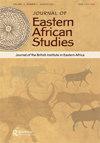选举失误与持久总统权力的失望:赞比亚的宪法制定
IF 0.6
3区 社会学
Q2 AREA STUDIES
引用次数: 8
摘要
关于非洲总统主义的力量,人们已经写了很多文章。本文研究了赞比亚总统权力在面对选举更替时的弹性。由多党民主运动(MMD)和爱国阵线(PF)发起的反对派竞选活动,以深入的宪法改革为突出的竞选承诺。尽管如此,在赢得总统大选后,两党都未能减少总统权力。我们通过对赞比亚自20世纪90年代初以来宪法制定的分析和对2016年最新修订宪法的分析来支持这一结论。我们认为,总统权力成为新当选精英的宝贵制度资产,他们试图减少选举的不确定性并巩固权力。因此,只要行政部门能够控制宪法制定过程,总统权力就不太可能减少。本文章由计算机程序翻译,如有差异,请以英文原文为准。
Electoral turnovers and the disappointment of enduring presidential power: constitution making in Zambia
ABSTRACT Much has been written about the strength of African presidentialism. This article studies the resilience of presidential power in Zambia in the face of electoral turnover. Opposition election campaigns, conducted by both the Movement for Multiparty Democracy (MMD) and the Patriotic Front (PF), featured deep constitutional reform as prominent campaign pledges. Nevertheless, after winning the presidency, both parties failed to reduce presidential power. We support this conclusion by an analysis of constitution making in Zambia since the early 1990s and an analysis of the latest 2016 amended constitution. We argue that presidential powers become valuable institutional assets for newly elected elites attempting to reduce electoral uncertainty and consolidate power. Consequently, reduction in presidential power is unlikely as long as the executive is able to control the constitution making process.
求助全文
通过发布文献求助,成功后即可免费获取论文全文。
去求助
来源期刊

Journal of Eastern African Studies
AREA STUDIES-
CiteScore
3.30
自引率
7.10%
发文量
12
期刊介绍:
Journal of Eastern African Studies is an international publication of the British Institute in Eastern Africa, published four times each year. It aims to promote fresh scholarly enquiry on the region from within the humanities and the social sciences, and to encourage work that communicates across disciplinary boundaries. It seeks to foster inter-disciplinary analysis, strong comparative perspectives, and research employing the most significant theoretical or methodological approaches for the region.
 求助内容:
求助内容: 应助结果提醒方式:
应助结果提醒方式:


